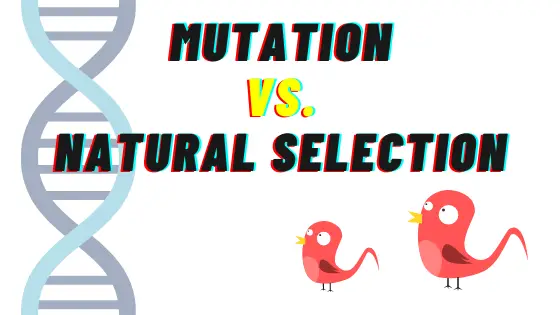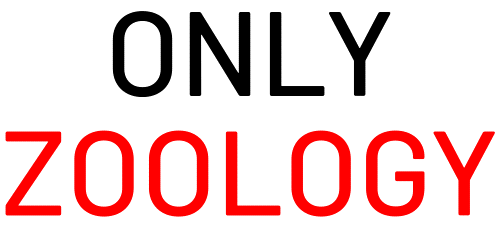Difference between Mutation and Natural Selection
In this post, we will know about the key differences between Mutation and Natural Selection. After reading this post, you can perfectly differentiate the two of these very clearly.
Make sure to read this complete post to understand the topic very clearly and precisely.
There are 5 mechanisms that cause evolution: mutation, genetic drift, gene flow, non-random mating, and natural selection.
Both mutation and natural selection are two of the most well-known concepts in evolution.
Mutation is well-popular in genetic studies while Natural Selection is the most popular in evolutionary studies.
Both mutation and natural selection show the change in the heritable traits of a population over generations. Mutation is a microevolutionary concept whereas, natural selection is a macroevolutionary concept.
The difference between mutation and natural selection is that mutation causes variations due to changes in the genes’ DNA sequence in an organism. Whereas, natural selection causes huge adaptations that lead to speciation.
Let’s know more about them with precise detail and comparison…

Comparison Chart: Mutation Vs. Natural Selection
| NO. | MUTATION | NATURAL SELECTION |
|---|---|---|
| 1. | It is a mechanism of evolution that leads to microevolution. | It is a key mechanism of evolution that leads to macroevolution. |
| 2. | Mutation causes changes in gene sequence leading to changes in an organism’s gene frequencies and variability rate. | Natural selection causes changes in the allele frequencies of a gene pool over time at a large-scale in a very long-time period. |
| 3. | Mutation leads to variations. | Natural selection leads to large-scale variations causing adaption. |
| 4. | Mutation can be inheritable and non-heritable. | Natural selection is always inheritable. |
| 5. | Mutation doesn’t cause speciation. | Natural Selection causes speciation. |
| 6. | The occurrence of mutation can be harmful or beneficial to the organism. | Natural selection brings only beneficial changes/adaptations in a living organism. |
| 7. | Mutation is random happening. | Natural selection is a selective happening impacted by nature/environment. |
| 8. | Mutation can take place due to error in DNA replication, UV from the sun, chemical factors, errors during cell division, etc. | Natural selection takes place due to variation in the fitness of organisms, or variation in individual characters that help them to better survive and reproduce in its environment. |
| 9. | Mutation causes genes DNA sequence changes that can lead to the creation or removal of beneficial polypeptides, creation or removal of harmful polypeptides, stopping of expression for some genes. | Natural selection can cause the creation of beneficial alleles, and the removal of harmful alleles, and can both increase or decrease the size of the gene pool of many populations as a whole. |
| 10. | It is better studied in a relatively small population. | It is better studied in a relatively large population. |
| 11. | It violates the Hardy-Weinberg equilibrium stating that evolution occurs due to mutation. | It also strictly violates the Hardy-Weinberg equilibrium. |
| 12. | Mutation needs other factors like gene flow, genetic drift, natural selection to cause speciation in an organism. | The effects of Natural selection alone can cause speciation in an organism. |
| 13. | There are two types of mutation: point mutation, and frameshift mutation. | There are three types of natural selection: directional selection, stabilizing selection, and disruptive selection. |
| 14. | Mutation can occur in two ways: Heritable or Acquired. | Natural selection can happen in many ways i.e. by heritable variation, differential reproduction, fitness selection, competition. |
| 15. | Result of mutation: modification of genes, formation of new genes, deletion of old genes. | Result of natural selection: adaptation for fit ones, speciation to better adapt, and extinction of unfit ones. |
| 16. | Beneficial mutations causes small genetic adaptions. | Natural selection always causes large type of noticeable adaptations. |
Definition of Mutation
Mutations are the changes that occur in the genetic makeover of the DNA. This means that mutation causes changes in the nitrogenous base sequence of the DNA like removing one nitrogenous base and adding another to each nucleotide of DNA.
A mutation is a permanent alteration of a gene’s DNA that makes the altered gene differ from what it is found in most organisms.
We know that genes (segments of DNA) can bring about genetic changes in the living body by producing proteins. It is the nucleotide base sequences of the DNA that codes for specific amino acids of the proteins with the help of mRNA and tRNA.
Therefore alteration of the sequences can cause the coding of different amino acids or the same kind of amino acids, or can even pause the coding of any type of amino acids. As a result, there occur genetic changes in the living body and the way genes are expressed.
Mutations can be caused by environmental factors such as UV from the sun, chemical factors, replication mistakes, or can occur if an error is made as DNA copies itself during cell division.
Mutation can be heritable or acquired. Heritable mutation can be inherited from generation after generation through DNA replication and meiosis. Whereas, an acquired mutation can’t be inherited and only remains effective until the organism is alive.
Gene mutations can be of two types: Point Mutation that arises due to change in a single base pair of DNA, and Frameshift Mutation that arises due to loss (deletions) or gains (insertions) on one or two bases in the DNA.
Example of mutation: It is seen that chimpanzees are our closest living evolutionary relatives that share 96% genes similar to humans. In the past, mutations had occurred at large-scale causing such genetic evolution of chimpanzees and humans from a common ancestor.
Definition of Natural Selection
Darwin explained evolution through its concept of natural selection. Natural selection is one of the key mechanisms of evolution and explains how evolution has taken place leading to the origin of many new species from a common ancestor.
Natural selection means the selection of the species due to the selective pressure of nature and the environment. This can be well-explained by the concept of the survival of the fittest.
According to the survival of the fittest concept of natural selection, it is stated that only those individuals who are with favorable variations are best adapted to the environment. The less fit and unfit organisms die and are eventually destroyed over time.
Unlike mutation that can be random, natural selection is always selective and can never be random.
Natural selection causes variations at a very large scale level causing adaptations that are beneficial and help the organism to better survive and reproduce.
Natural selection is, in fact, the most predictable and most conceptual reason for evolution to occur at the macro-level due to the selective pressure of the environment.
It’s an evolutionary process in which an ancestral form in order to better adjust, survive, and reproduce gives rise to new descendent species adapted to new habitats and new ways of life over the course of time (maybe thousands to millions of years).
Example of natural selection: The finches (small black birds) in the Galapagos Island shows that those species that eat large seeds tend to have large-tough beaks, while those that eat insects have thin-sharp beaks. All have originated from their ancestral seed-eating finches through large-scale natural selection.
Key Differences Between Mutation and Natural Selection
1. Mutation leads to variations that change generation after generation, only beneficial mutations lead to small-scale adaptations. Whereas, Natural selection leads to adaptations and finally speciation.
2. Mutation causes the alteration of the genes’ DNA sequences that are inherited to the offsprings to proceed with evolution. Whereas, natural selection with the proper co-ordination of mutation, gene flow, and genetic drift causes adaptations that are inherited to the offsprings to proceed with evolution.
3. Mutations may be random, but are not entirely random, a new study suggests. Natural selection is not at all random but of selective type.
4. Mutation can lead to harmful or beneficial gene expression in the organism. Whereas, natural selection only leads to beneficial changes in the organism to make it stay fit and active.
5. Mutation only takes place at the molecular level. Whereas, natural selection is a board concept that can take place at the genetic level, physiological level, psychological level, reproductive level, morphological level, and anatomical level.
6. Mutations occur at some time during an organism’s life. Whereas, the natural selection process takes over several generations and possibly over millions of years afterward expected to form new species.
7. Mutation is an off-chance that doesn’t guarantee that a gene that is passed on to the offspring will be present in the future. Whereas, natural selection is a macroscopic tendency for genes, or particular combinations of genes, that survive to persist in the future.
8. Mutation expresses how the diversity in genes and their genetic sequence increases or decreases. Whereas, natural selection expresses how the diversity of life increases.
9. Single mutational changes can’t be so easily seen phenotypically until and unless many successive mutations are studied together. Whereas, natural selection changes are well-seen and expressed both genotypically and phenotypically.
Relationship Between Mutation & Natural Selection
The relationship between mutation and natural selection is that both of these are the mechanisms of evolution that take place generation after generation from parents to offsprings bringing about various adaptations and ultimately speciation.
Mutations occur by chance or randomly whereas, natural selection occurs due to the environment’s selective pressure on an organism.
READ MORE: Relationship between Mutation and Natural Selection
Conclusion
Population changes over time. The change can be inferred in several ways. And there are fundamental factors that are involved in bringing changes in a population.
These factors include natural selection and mutation along with gene flow, genetic drift, and non-random mating.
Evolution can’t be imagined without these and so they find the top place in evolutionary studies.
Chemical and energetic mutations are one mechanism that acts to cause changes in a population’s genetic composition.
Once such changes arise they may be selected for or against on the basis of relative fitness with respect to the environment, through natural selection.
